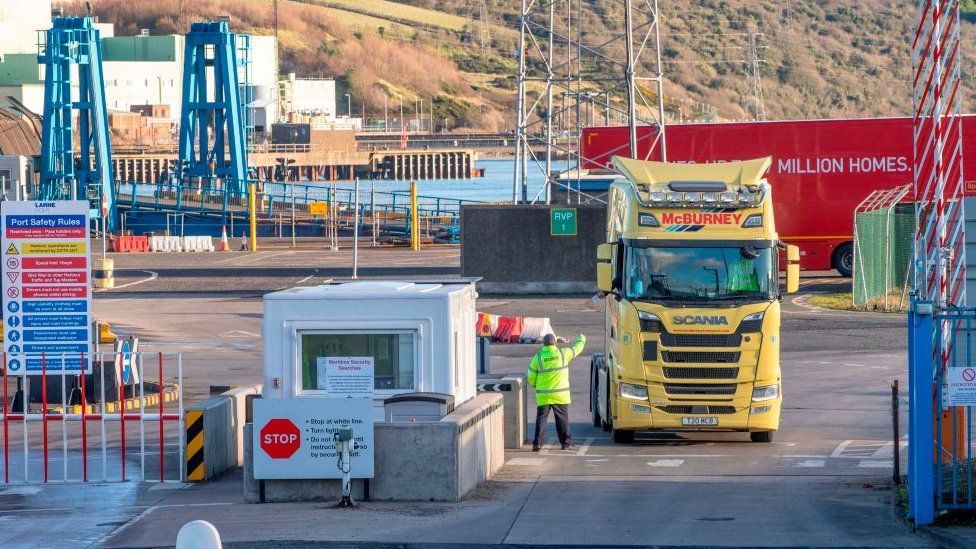ARTICLE AD BOX

The protocol is a special arrangement that keeps Northern Ireland in the EU's single market for goods
By Jayne McCormack
BBC News NI political correspondent
Irish Foreign Minister Simon Coveney has said he does not believe the dispute over the Northern Ireland Protocol will be solved within weeks.
The UK and EU are holding technical talks over the protocol on Thursday afternoon, in a bid to make progress.
The meeting will be via video link, with a timetable for further negotiations yet to be confirmed.
Mr Coveney is also due to meet Foreign Secretary James Cleverly on Thursday evening.
Earlier, Mr Coveney told the Dail (Irish Parliament) that his meeting with Mr Cleverly would "focus on timelines and subjects where we think it's possible to make progress sooner rather than later".
"I don't believe it's going to be possible to resolve the issues linked to the implementation of the protocol by 28 October," he added.
"But I do think we can make significant progress on some of the issues that really matter to the people of Northern Ireland - in particular to the unionist community and the business community."
Image source, PA Media
Image caption,Irish Foreign Minister Simon Coveney and Northern Ireland Secretary Chris Heaton-Harris are due to attend a British-Irish Intergovernmental Conference in London on Friday
Under current rules, if devolution is not restored by 28 October, Northern Ireland Secretary Chris Heaton-Harris is obliged to set a date for a fresh Stormont election.
He has rejected suggestions the government would delay the deadline, if talks on the protocol have not made progress by then and said he would "push the button" on an election, if required.
A British-Irish Intergovernmental Conference is taking place in London on Friday.
It is a body set up to promote co-operation between the UK and Ireland and brings together representatives from both sides of the Irish Sea.
Mr Coveney is due to attend the latest meeting of the conference, alongside Mr Heaton-Harris and Northern Ireland Minister Steve Baker.
The tánaiste (Irish deputy prime minister) Leo Varadkar said a "window of opportunity" exists for the UK and the EU to reach agreement on the protocol.
What is the Northern Ireland Protocol?
The protocol, part of the UK government's Brexit deal to leave the European Union, keeps Northern Ireland aligned with the EU's single market to ensure free trade can continue across the Irish land border.
However, unionist politicians have protested against the protocol for resulting in additional checks being placed on some goods moving between Great Britain and Northern Ireland.
In June, while Liz Truss held the position of foreign secretary, she introduced legislation in Parliament that sought to give UK ministers powers to unilaterally scrap large parts of the deal.
It said overriding parts of the deal would break international law.
The DUP has blocked the functioning of Northern Ireland's legislative assembly and governing executive because it believes the protocol undermines Northern Ireland's position within the UK.
The party's Edwin Poots, Stormont's agriculture minister, said the impasse which has been created could lead to the "funeral of the Good Friday Agreement".
But on Tuesday the secretary of state said he was "very confident" that a deal could be reached between the UK and EU, adding that it would "absolutely have the support of the DUP".
Under current rules, if devolution is not restored by 28 October, Mr Heaton-Harris is obliged to set a date for a fresh Stormont election.
He has rejected suggestions the government would delay the deadline, if talks on the NI Protocol have not made progress by then and said he would "push the button" on an election, if required.
The UK and EU already have what might be called 'conceptual agreement' on a key aspect of the protocol.
Both sides have said that goods from Great Britain which are entering Northern Ireland and are staying there should be treated with a lighter touch than Great Britain goods which are destined to cross the Irish border.
The EU has proposed an 'express lane' while the UK talks about 'green and red lanes'.
However, the two sides are far apart on what this should mean in practice.
The UK thinks the system should require traders to use little more than normal commercial invoices; the EU said it needs stronger assurance processes to protect its single market.
These technical talks will try to narrow that gap.

 2 years ago
14
2 years ago
14








 English (US)
English (US)